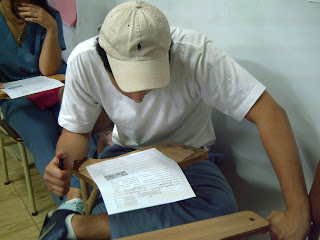
What Affects English as a Foreign Language Learners During Exams
Lina Maria Lopez* squirmed in her seat for the fiftieth time, scratched her scalp until it was nearly raw and sighed repeatedly. A mechanical pencil in one hand and a bright red lollipop in the other, she struggled abysmally with her final exam in English as a foreign language. Only in her second semester of English, the “lights” still hadn’t “clicked on” yet. Not a good university student across the board in her major, English as a foreign language was still her worst subject. She gazed around the room, at other learners’ papers, at the EFL teacher and reluctantly, at her EFL test paper.
“Tap, tap, tappity, tap, tap”. Luis Felipe Rodriguez* drummed on the desk, tapped his well-worn sneakers, hummed a Salsa beat and turned around to look behind him at the poster-plastered classroom wall for “inspiration”. “Da, da, dada, da, da – dat, dat dada, dum.” His English as a Foreign Language level two exam paper was still nearly blank. More than half the final exam allotted time had already passed. It he failed this exam too, he’d almost surely have to repeat the English level next semester. It had already taken him an extra semester just to get this far. “What time is it?” he asked the teacher, tugging on the bill of his baseball cap. But, it really didn’t matter.
The Functional Needs of the Brain
EFL teachers should know that the human brain needs three key elements to function at peak efficiency. These are: oxygen, water (fluids) and sugar (preferably from complex carbohydrates). Both immediately before and during an exam, it’s not uncommon to see English as a Foreign Language learners eating chocolate, hard candy, lollipops or even packets of raw sugar. I draw the line at chewing gum, largely due to its “tendency to wind up” stuck under the desks. It’s because of the brain’s need for sugars that I allow “eating” of high-carbohydrate and high sugar content “foods” before, during English as a foreign language exams.
Some "Causes" of Cheating on English as a Foreign Language Exams
When EFL learners openly or frequently “cheat” on exams, highly probable “causes” are typically one or more of these motivation-related factors which include:
• Lack of English as a foreign language grammar and theme study
• Poor English class attendance
• Failure to understand or apply English as a foreign language skills promoted in class
• Insufficient English as a foreign language skills practice / repetition to successfully internalize the skills and materials
• Ineffectively focused teaching methods
• Deficiency in English language classroom materials
• “Chemical addiction/dependency” problems (i.e., caffeine, nicotine, etc.)
• Personal or family problems
• Not taking English as a foreign language studies seriously enough
• Poor language-learning aptitude
• Learning disabilities
• Lack of sufficient or effective English as a foreign language learning preparation resources
This is certainly but a “partial” list of the possibilities. These can affect not only English as a foreign language skills development, but the overall intrinsic and extrinsic motivation of the EFL learners.
EFL Teacher-Affective Factors
Then, of course, as English as a foreign language teachers, we often endure a multitude of additional factors which directly or indirectly impact and affect the intrinsic / extrinsic motivation of our EFL learners. How many of you, for example, are negatively impacted by:
• Large EFL learner class groups
• An excessively low number of English as a foreign language contact hours per week
• Behavioral problems on the part of your English as a foreign language learners
• Excessive administrative demands
• Lack of resources, equipment and / or materials
• Extremes of mixed ability in English language knowledge and skills among your EFL learners
• Lack of sufficient, on-going governmental, administrative, or parental support
• Personal problems of your own
Certainly, the list could go on, but you get the point, don’t you?
What Can You Do, If Anything?
In upcoming article posts in this series, we’ll continue to consider some possibilities which English as a foreign language teachers and EFL learners have available to address, minimize or eliminate many of the aforementioned intrinsic and extrinsic affective factors. Doing so will undoubtedly improve our EFL learners’ motivation. With these incorporated into ourm curriculums and daily schedules, we should be able to generate some improvement and more success in our EFL classrooms and our English as a foreign language learners themselves.
Prof. Larry M. Lynch is an EFL Teacher Trainer, Intellectual Development Specialist, author and speaker. He has written ESP, foreign language learning, English language teaching texts and hundreds of articles used in more than 125 countries worldwide. Get your FREE, pdf format report on CD or via e-mail, "Creative, Dynamic Ways to Motivate and Teach English as a Foreign Language to Diverse Groups of Reluctant Learners" by requesting the title at: lynchlarrym@gmail.com







1 comment:
I think this is a real danger. I teach in Japan and a lot of the times we end up teaching towards the test because they need to pass it. I think one of the best strategies is to just tell students they are going to do well. Confidence can sometimes make the difference of a few points.
Murray Kendall
Post a Comment